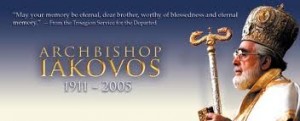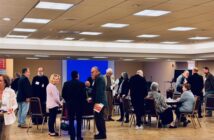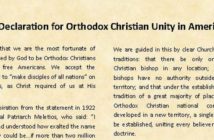 Source: Orthodox Christian Laity
Source: Orthodox Christian Laity
Sunday April 1974…Sunday of Orthodoxy…Why the failure to unite the Orthodox Church in the United States? The Assembly of Bishops has this task in 2013. Let us pray that they have the strength and courage to work in synergy with the Holy Spirit to do God’s Will for His Church. “It is high time that the Orthodox Christians in America rise to the demands of the time, look ahead and endeavor to respond to the unanswered questions of a whole generation – the generation of the American-born Orthodox, who do not understand the reason or reasons for the existing divisions which reduce Orthodoxy to loud and proud, but empty declarations of false and non-existing spirituality.” – Archbishop Iakovos. [George E. Matsoukas]
I come to join with you in singing the theme or the Prokeimenon of the day: “Thou has given an inheritance, O Lord, to them that hear Thy Name,” and to turn the eyes of my soul, together with yours, at the gladsome radiance of the evening in which we all can discern the presence of the Father, and of the Son and of the Holy Spirit – the Triune God – in Whom we the Orthodox move and live and have our being.
I came upon your insistence and out of my care and concern that we the Orthodox Christians, render a united witness to the true faith, which is put to the test and persistently challenged even by those who profess it.
It is high time that the Orthodox Christians in America rise to the demands of the time, look ahead and endeavor to respond to the unanswered questions of a whole generation – the generation of the American born Orthodox, who do not understand the reason or reasons for the existing divisions which reduce Orthodoxy to loud and proud, but empty declarations of false and non-existing spirituality.
This is not an easy statement for me to make. But I owe it to God, to the Church and to the history which tells us that a layman, namely Alexander Solzhenitsyn, had the courage to proclaim Orthodoxy as a living faith by example. For Alexander Solzhenitsyn lived Orthodoxy as no one has ever lived it in the free world, and in such troubled and demanding times as these in which we presently live. We in the United States, from professorial chairs and from the pulpit do declare the militant and the prophetic character of Orthodoxy. But as a church we have failed, and lamentably so, to either prove it or live it in the fearless and deeply conscientious manner in which Solzhenitsyn has witnessed it.
You, my fellow communicants, have been told by us your clergymen that Orthodoxy is synonymous with Christianity and further that there is no salvation outside of Orthodoxy. You have been told that Orthodoxy is made of faultless dogmas, traditions and canons which you can state at all times, particularly when engaged in dialogue with the non-Orthodox. But, can we commit our own minds and consciences and souls to these truths with the same fervor?
The hour of Orthodoxy my friends, is not tomorrow. It is NOW! For Orthodoxy as we proclaim it in the morning services and again this evening, presents us and the world, with the challenge to live Christianity with a glad and vibrant heart; and thus proclaim it as the only inspiring and creative and saving faith. Orthodoxy is an overflowing fountainhead from which all Christians can draw and quench the thirst of their souls. Orthodoxy belongs to all, as Christianity and truth and God belong to all.
Orthodoxy is being characterized as a liturgical faith; and it is so, because Orthodoxy believes that it is a religion at the service of the people, rallying the people, and moving the people and leading the people forward, not only in moments of danger or distress, but also in times of prosperity and peace. For Liturgy has always been the very soul and conscience of Orthodox Christianity.
Liturgical processions in the Orthodox tradition are manifestations of the spiritual impact which their belief in the living God exerts upon their lives. Orthodoxy is not a casual or an occasional religious experience. It responds to a Christian’s day-to-day existence and to all of his aspirations and needs, which are prompted either by relations, actions, interactions and reactions with his fellow men or by nature itself.
Orthodoxy should prove itself true to its much-prized self-definition that it is the religion of the Nativity, of the Transfiguration and of the Resurrection. We must therefore, unhesitatingly, live the Nativity as continued rebirth and renewal; the Transfiguration as a process of transforming habits and weaknesses into spirituality and moral fortitude; the Resurrection as a state of ever-living and intimated faith and hope. And what better time than the present is there for Orthodoxy to ascertain the truth of this definition in a world that is unable to define correctly even one of the problems which besets it.
As Orthodox Christians, we would do well to meditate for a while, to pray that we may be enabled to rediscover Orthodoxy, the never-retreating, the ever-struggling faith of our fathers. We would do well if during the remainder of this Vesper Service, we also tried to understand Orthodoxy in the context of its global responsibility, in its diakonia to the world; in its all-embracing and ecumenical concern for unity, peace and salvation in the world. The day is far spent; there is no time for further delays. Orthodox Christians should be on the alert. Orthodox born or living in America, while repeating their over-declared loyalty to the true faith, should do all that is necessary to also prove their loyalty to the true faith. It is only through such binding thoughts and committed hearts that we Orthodox could unite, strengthen and render a convincing witness which would be both liberating and meaningful. It is only through such a bold action that we could bring honor to our Mother Church and give it an additional reason for continuing its fight for survival and perpetuation. It is only through our unity in faith and action that we could help our respective Mother Churches to seek closer relations with one another and new opportunities for greater solidarity among themselves, for a united clear voice in ecumenical and international affairs, for a renewed and bolder initiative in their concern for the dignity of God created Man. What we need to restore today is not the icons, but the image of God , and imprint it indelibly upon the hearts of all. And together with the image we must restore the image of a united Orthodoxy, thus generating in our hearts and in the hearts of our people, the hope for a United Church whose boundaries would be determined by love and only by love….
[subscribe2]


1 Comment
I, for one, never believed in discord between Orthodox churches in America or elsewhere in the world.
Greek, Russian, Romanian, Bulgarian, Coptic, Ethiopian, Syrian or my own Serbian are same to me, as I feel all my Orthodox brothers and sisters as the part of my own being. We are one and as special and precious as our faith is.